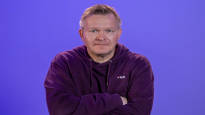The traditional javelin seminar was delightfully international again. The top event attracts more interest abroad than in Finland, and the numbers speak for themselves, writes Pekka Holopainen.
Pekka Holopainen sports reporter
At the World Championships in Budapest this year, both gold medals from the javelin throw went to Asia. The women’s competition was even won by Japan, which is developing into a dominant force in the sport Haruka Kitaguchi.
The men’s gold also went to the thrower, whose home country will be heard about in the Finns’ traditional favorite sport long after him – to the Olympic champion of India, which is developing into a fierce javelin country To Neeraj Chopra.
It is very descriptive of the global evolution of the javelin that the throwers in question have been tuned to gold medal condition by European forces. Kitaguchi is coached by a Czech David Sekerak. Chopra’s coach, on the other hand, is a German biomechanics great with a GDR background who earned a doctorate in the Soviet Union Klaus Bartonetz.
The sharpest point
The burning flame of the evolution of javelin throwing in Finland is Kuortanee’s traditional, international Javelin Seminar, which was organized in mid-November. The javelin seminar is without a doubt the one that represents the sharpest international top in its field among the similar events held in Finland.
This time, Kuortane sports college had scripted such an impressive coverage that David Sekerak traveled from Prague with his adjutants to be a listening student. Klaus Bartonietz’s lecture on the Indian spear miracle and its background was the main attraction of the second day of the seminar, who spoke about his own career and its sad sudden end Magnus Kirtin alongside the speech.
Content values of iron
The content values were full of iron throughout the event.
Katse reached the audience focused on the lectures from the auditorium of the sport’s international top coaching center, this time around 15 sports coaches from the Indian Federation Jai Choudhary down to.
But the eye looked for something else in vain. Only the non-union paid coaches of Finland’s top throwers sat in the hall Topias Wave father Yki Laine.
Of course, they came there for their work Toni Kuuselaa and Toni Kerä coaching SUL’s track coach Petteri Piironen and this pair of horns, Lassi South house helping in coaching matters Tuomas Laaksonen. Also an emeritus coach Kari Ihalainen listened intensively to all speeches. Likewise, the Belgian active thrower Timothy Hermanwhose over 87-meter dash was one of the great sensations and leaps in results of the last javelin season.
They shined in their absence
Many Finns were conspicuous by their absence. The situation can of course be considered comforting to the extent that these coaches and other sports people most obviously already know all the things for which Sekerak, who has just coached his athletes to become world champions, and Bartonietz, who is well over 70 years old, took pains from Central Europe to South Ostrobothnia.
Sports coach Piironen did not hold his candle under the bushel when assessing why the traditional seminar this time was even won by an unwanted foreigner. Piironen’s personality has been considered tearful, unnecessarily outspoken. The sports coach cannot understand why the direct talk about problems, which is necessary in top sports – of which there are indeed plenty – always causes the sports community to immediately get on its back.
If some Finns were left out because of the personality of the sports coach, that would be a less annoying reason than the other possibility: the quiet fading of the sport into the margins and into the gallery of honor of sports museums.
Honestly, internationally, there really aren’t enough athlete-coach pairs to make ends meet. The age groups are also collapsing just over there in Finland, where javelin throwing has still interested children.
A scratch of the results shows the direction: 92 boys threw a result in the 19-year-old series in 2013. This year, the number was 44. When we go to the 17-year-olds, the numbers are 171 and 94.
In the midst of this, of course, it is comforting that the Finnish coaches feel that they are fully educated.
Pekka Holopainen
The author is a columnist based in Pori and the only sports reporter who has been selected as Journalist of the Year in Finland.
What thoughts did the story evoke? You can discuss the topic on 28.11. until 11 p.m. Tunnus is required for commenting.
